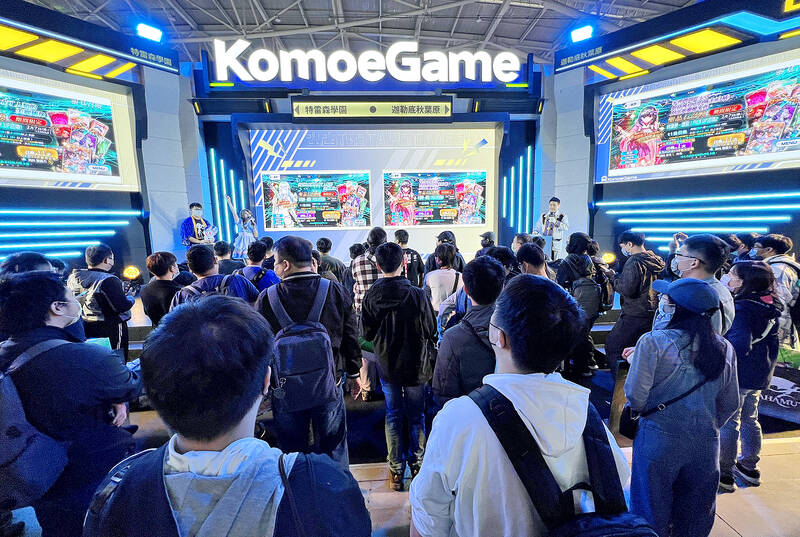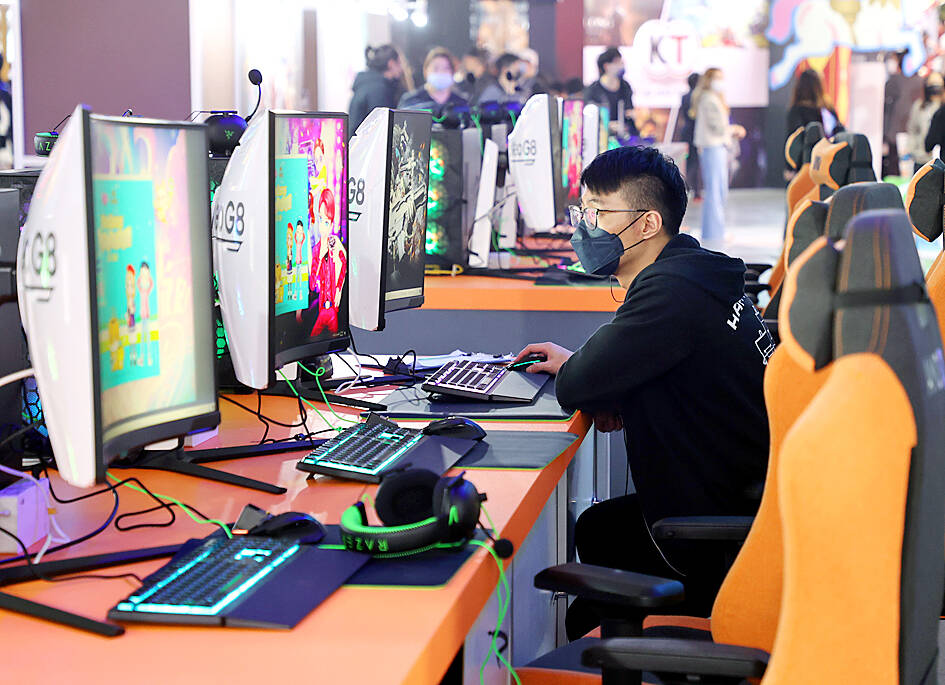The Taipei Game Show opened yesterday with large crowds of gaming enthusiasts visiting more than 1,000 booths featuring 275 vendors from 25 countries, while gaming companies from Asia expressed eagerness in forming partnerships with counterparts in Taiwan.
Gamers, cosplayers and businesspeople from the gaming industry took part in various activities at the 1,150 booths, which showcased new gaming products such as games and consoles, gaming peripherals and e-sports gear.
One of the major sections of the annual game show is the B2B Zone, where companies from countries such as Japan, South Korea, Singapore, Malaysia and the Philippines are looking to form partnerships with Taiwanese firms and clients.

Photo: CNA
The B2B Zone features game publishers, payment service providers, sound production service providers, cloud integration providers and other companies throughout the game industry chain.
Aleson Buenavista, studio manager of Philippine art, animation and game development company Definite Studios, said that he wanted to make connections with Taiwanese companies that can offer game localization, and collaborate on art and animation.
Definite Studios currently has five projects on which it is working with Taiwanese companies, Buenavista said.

Photo: CNA
“It is very nice to talk to Taiwanese people and [Taiwan] is very near to the Philippines, so if there is any need for us to travel and check in with our client, it is very easy for us to travel, because it is only one and a half hours away from the Philippines,” Buenavista said.
Another company, Ranida Games, is also at the B2B Zone promoting one of its action fighting games Vita Fighters in hopes of finding a partner to localize the game for the Taiwanese market.
Taiwan “has a very good fighting game community and has very good fighting game players. We would like to localize this, with traditional Chinese, so we can easily attract more players,” said Walter Manalo, head of the company’s business development.
The game has been downloaded about 200,000 times on mobile phone platforms in the Philippines and downloaded 800,000 times worldwide, Manalo said, adding that his company is looking for a company that can publish the game on a console such as PlayStation or Xbox.
Other games featured at the show include major names such as new action role-playing game Wo Long: Fallen Dynasty and the role-playing adventure Atelier Ryza 3: Alchemist of the End & the Secret Key.
The game show runs until Sunday at Taipei Nangang Exhibition Center’s Hall 1.

MULTIFACETED: A task force has analyzed possible scenarios and created responses to assist domestic industries in dealing with US tariffs, the economics minister said The Executive Yuan is tomorrow to announce countermeasures to US President Donald Trump’s planned reciprocal tariffs, although the details of the plan would not be made public until Monday next week, Minister of Economic Affairs J.W. Kuo (郭智輝) said yesterday. The Cabinet established an economic and trade task force in November last year to deal with US trade and tariff related issues, Kuo told reporters outside the legislature in Taipei. The task force has been analyzing and evaluating all kinds of scenarios to identify suitable responses and determine how best to assist domestic industries in managing the effects of Trump’s tariffs, he

TIGHT-LIPPED: UMC said it had no merger plans at the moment, after Nikkei Asia reported that the firm and GlobalFoundries were considering restarting merger talks United Microelectronics Corp (UMC, 聯電), the world’s No. 4 contract chipmaker, yesterday launched a new US$5 billion 12-inch chip factory in Singapore as part of its latest effort to diversify its manufacturing footprint amid growing geopolitical risks. The new factory, adjacent to UMC’s existing Singapore fab in the Pasir Res Wafer Fab Park, is scheduled to enter volume production next year, utilizing mature 22-nanometer and 28-nanometer process technologies, UMC said in a statement. The company plans to invest US$5 billion during the first phase of the new fab, which would have an installed capacity of 30,000 12-inch wafers per month, it said. The

Taiwan’s official purchasing managers’ index (PMI) last month rose 0.2 percentage points to 54.2, in a second consecutive month of expansion, thanks to front-loading demand intended to avoid potential US tariff hikes, the Chung-Hua Institution for Economic Research (CIER, 中華經濟研究院) said yesterday. While short-term demand appeared robust, uncertainties rose due to US President Donald Trump’s unpredictable trade policy, CIER president Lien Hsien-ming (連賢明) told a news conference in Taipei. Taiwan’s economy this year would be characterized by high-level fluctuations and the volatility would be wilder than most expect, Lien said Demand for electronics, particularly semiconductors, continues to benefit from US technology giants’ effort

‘SWASTICAR’: Tesla CEO Elon Musk’s close association with Donald Trump has prompted opponents to brand him a ‘Nazi’ and resulted in a dramatic drop in sales Demonstrators descended on Tesla Inc dealerships across the US, and in Europe and Canada on Saturday to protest company chief Elon Musk, who has amassed extraordinary power as a top adviser to US President Donald Trump. Waving signs with messages such as “Musk is stealing our money” and “Reclaim our country,” the protests largely took place peacefully following fiery episodes of vandalism on Tesla vehicles, dealerships and other facilities in recent weeks that US officials have denounced as terrorism. Hundreds rallied on Saturday outside the Tesla dealership in Manhattan. Some blasted Musk, the world’s richest man, while others demanded the shuttering of his